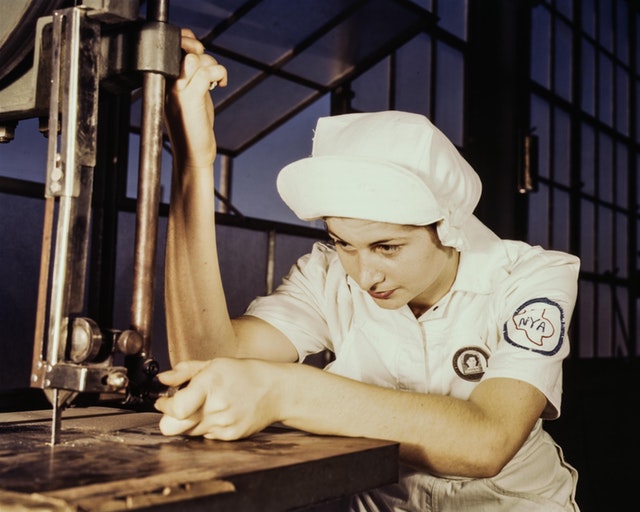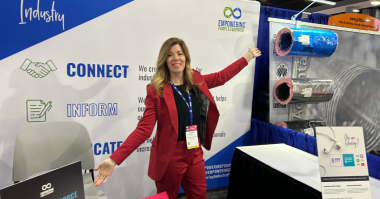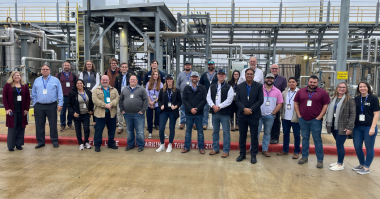Watch this video (it’ll give you goosebumps!): https://youtu.be/drKOixEGARo
Author: Cieana Detloff, Reporting for Empowering Pumps
In 2016, the Bureau of Labor Statistics reported that women held only 28.9% of the manufacturing jobs1 in the United States. While the country’s STEM workforce is no more diverse than it was 14 years ago, there are many major companies working to change this; with GE recently pledging to hire 20,000 women into technical roles by 20202.
“It is very important to employ women in manufacturing,” declares Allison Grealis, founder and president of Women in Manufacturing (WiM), a national trade association focused on supporting, promoting and inspiring women in the manufacturing sector. “Women bring a whole different perspective and skill set to common problems. A man representing IBM at a conference recently shared real world stories about how his best teams were the ones that were diverse in nature. Teams with a healthy mix of men and women highly outperformed those made up of individuals of a single gender or background.”
Grealis, whose father worked at Firestone Tires, was exposed at an early age to the concept of careers in the manufacturing sector. Having worked with the Precision Metalforming Association since 2001, Grealis searched for a national resource for women in manufacturing and found none, which eventually led to the creation of WiM in 2011. Having national trade associations that encourage women to connect and share their perspectives is essential to growing the number of women in the manufacturing workforce, along with a major ‘culture shift’ that is badly needed, but taking place rather slowly.
“In my experience, women are met with a range of preconceived perceptions,” explains Jennifer K. Muir, P.E., founder and president of JKMuir, an engineering and energy consulting firm. “I enjoy surprising clients with what women are able to bring to the table. Our company is comprised of almost entirely young female engineers, and they are highly-trained pump specialists. They enter industrial water and wastewater facilities and often surprise managers by being hands-on and climbing around their pumps and equipment. Being a woman in a male-dominated field means there is a proving ground, and many of our clients are surprised when they find out we know what we’re doing. This is not to say that the overwhelming viewpoint is that this kind of work is just for men, but that people still seem to be surprised by women’s capabilities in these areas.”
While girls’ engagement in STEM is aggressively being addressed across the country at the elementary education level in an effort to fill the workforce pipeline, industry is trying to address misconceptions about what modern manufacturing looks like. “The industry has to do a better job of showing what manufacturing is all about. It isn’t just about making a product, it’s about innovation,” states Grealis. “We have found the biggest challenge is that most women don’t understand the opportunities in manufacturing. Our biggest goal as the only association for women in manufacturing is to highlight them. We show what a career looks like, how diverse it is, the problem-solving skills needed, and how no challenge is the same. We have launched a series – Hear Her Story– which profiles leading women in manufacturing. If women don’t see it, they may think manufacturing is not for them.”
Manufacturing is not just a field where more women are needed, it is also a field that is vulnerable when it comes to retention. According to a study conducted by the Society of Women Engineers, many of the factors driving women employees from STEM fields have nothing to do with family3. The study revealed that men and women had the same complaints (bureaucracy and hierarchy), but women responded to those obstacles differently. “Women want to make a difference in their careers and have a positive impact on the world,” shares Michael Michaud, Executive Director of the Hydraulic Institute. “Women often approach problems differently and they bring a unique perspective in problem solving, team building, and getting things done. Women are underrepresented in some sectors of manufacturing, but there is effort to change that. We are holding a roundtable where women in industry can share their stories and tell us how the Hydraulic Institute can help. I’m hopeful these insiders will be able to identify barriers and talk about how we can help increase diversity and promote gender intelligence in our industry.”
Diversity adds value to any organization. When we bring women and men together from different backgrounds, we innovate to solve the world’s toughest challenges. Not having the same background or life experience is necessary to nurture a healthy manufacturing workforce.
What are your thoughts? Please use the comments section below to share your experience working in the manufacturing sector.
UPDATE!! Empowering Pumps has recently discovered MFGtalkradio.com! Check out their weekly podcast for Women & Manufacturing!
References:
1 https://www.bls.gov/cps/cpsaat18.htm
https://www.huffingtonpost.com/caroline-turner/the-business-case-for-gen_b_7963006.html





As a (woman) mechanical engineer for the last 30+ years, I can tell you how many disappointments I’ve had. Not just personally, but in overview currently. My greatest disappointment is seeing so many women engineers quit work in engineering to raise children, then never go back, or just switch careers to other business sectors. Retaining women in engineering is a big problem, with less than 10% still working in the business up to retirement. Knowing this, and how I’ve been treated through the years, the battles I’ve fought, etc., I would still be cautious about encouraging women to pursue STEM careers unless they have a very strong personality and commitment to it. Sorry to be pessimistic, but I’ve “been there done that” and am currently unemployed with little hope of changing that.
And I hope that we can help our girls have strong personalities and confidence, so they can pursue any career they want! Also, we need to improve our job environments to allow for flexibility and career development programs.